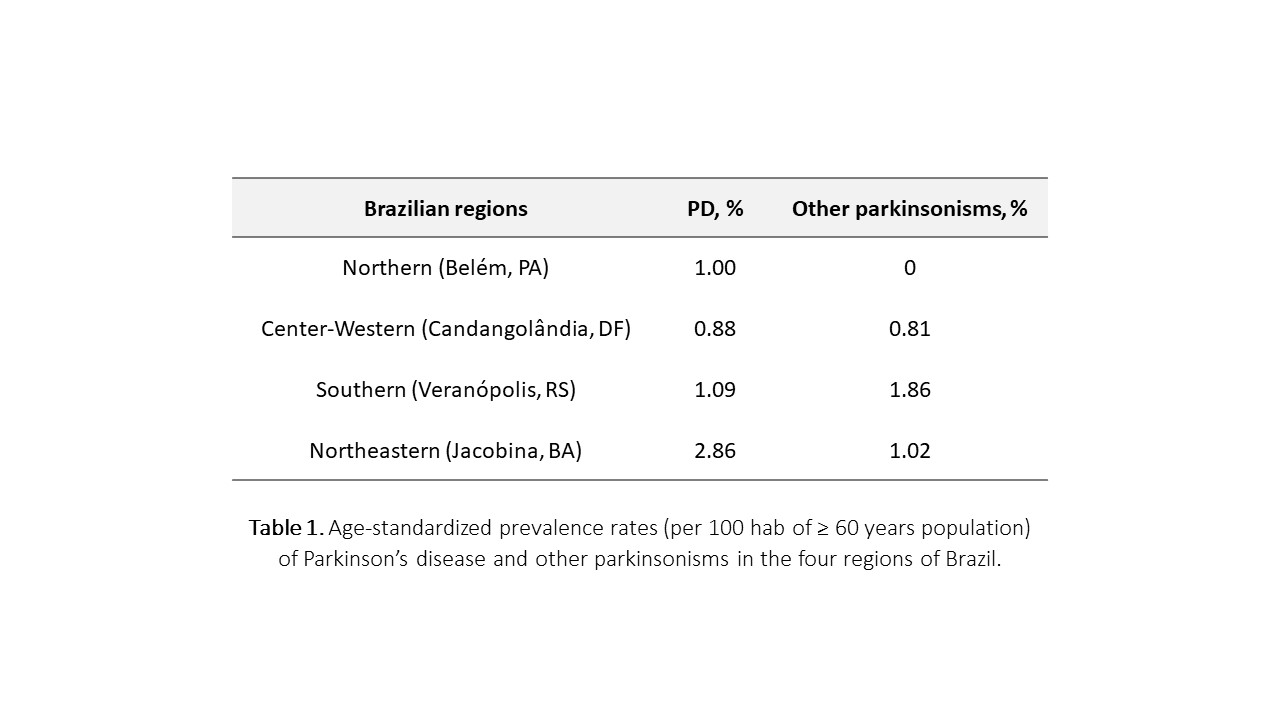Category: Epidemiology
Objective: The Prodromal and overt Parkinson’s Disease Epidemiological Study in Brazil (PROBE-PD) aims to estimate the prevalence of PD and other parkinsonisms (drug-induced, vascular, multiple system atrophy, progressive supranuclear palsy, corticobasal degeneration, dementia with Lewy bodies) in Brazil.
Background: Parkinson’s disease (PD) is a chronic and progressive disease that affects people of all ages but is most commonly diagnosed in individuals over 60. Research on the prevalence of PD has predominantly focused on high-income countries lacking diversity, while this data is poorly described in middle- and lower-income countries.
Method: A population-based observational study was conducted in four Brazilian cities: the insular portion of Belém (Brazilian Amazon, Northern Brazil), Veranópolis (Southern Brazil), Candangolândia (Center-Western Brazil), and Jacobina (Northeastern Brazil). Eligibility criteria included subjects aged ≥ 60 years from these locations. These participants were first screened door-to-door with the Tanner questionnaire [1] and the REM Sleep Behavior Disorder Single Question Screen. Subsequently, a movement disorder specialist examined the subjects with suspected parkinsonism or RBD to confirm the diagnoses.
Results: The preliminary analyses included 5931 participants (51,1% male, 69.6 ± 8 years, 36,1% low-grade primary incomplete). A total of 2505 subjects were selected for the in-person movement disorder specialist evaluation, of which 1578 were evaluated. The crude prevalence rate for PD was 1.24% (n = 79), and for other parkinsonisms was 1.34% (n = 158). There were differences in the age-standardized prevalence rate among centers (Table 1).
Conclusion: The prevalence of PD and other parkinsonisms in elderly individuals observed in our preliminary results was lower when compared to a previously reported survey in Brazil [3]. More epidemiological information about PD is crucial to acknowledge its burden and aid in planning healthcare services and public policies for these underrepresented populations.
Table 1
References: [1] Tanner, C.M.; Gilley, D.W.; Goetz, C.G. A brief screening questionnaire for parkinsonism. Annals of Neurology 1990 Aug; 28(2): 267-268. https://eurekamag.com/research/029/599/029599608.php. PMID: 0364-5134.
[2] Postuma RB, Arnulf I, Hogl B, Iranzo A, Miyamoto T, Dauvilliers Y, Oertel W, Ju YE, Puligheddu M, Jennum P, Pelletier A, Wolfson C, Leu-Semenescu S, Frauscher B, Miyamoto M, Cochen De Cock V, Unger MM, Stiasny-Kolster K, Fantini ML, Montplaisir JY. A single-question screen for rapid eye movement sleep behavior disorder: a multicenter validation study. Mov Disord. 2012 Jun;27(7):913-6. doi: 10.1002/mds.25037. PMID: 22729987.
[3] Barbosa MT, Caramelli P, Maia DP, Cunningham MC, Guerra HL, Lima-Costa MF, Cardoso F. Parkinsonism and Parkinson’s disease in the elderly: a community-based survey in Brazil (the Bambuí study). Mov Disord. 2006 Jun;21(6):800-8. doi: 10.1002/mds.20806. PMID: 16482566.
To cite this abstract in AMA style:
L. Pedrosa, J. Duarte, G. Pereira, I. Oliveira, S. Titze-de-Almeida, A. Schuh, C. Rieder, G. Valença, P. Brandão, L. Krejcová, B. Santos-Lobato. Prodromal and overt Parkinson’s Disease Epidemiological Study in Brazil (PROBE-PD study): preliminary results [abstract]. Mov Disord. 2024; 39 (suppl 1). https://www.mdsabstracts.org/abstract/prodromal-and-overt-parkinsons-disease-epidemiological-study-in-brazil-probe-pd-study-preliminary-results/. Accessed January 4, 2026.« Back to 2024 International Congress
MDS Abstracts - https://www.mdsabstracts.org/abstract/prodromal-and-overt-parkinsons-disease-epidemiological-study-in-brazil-probe-pd-study-preliminary-results/

